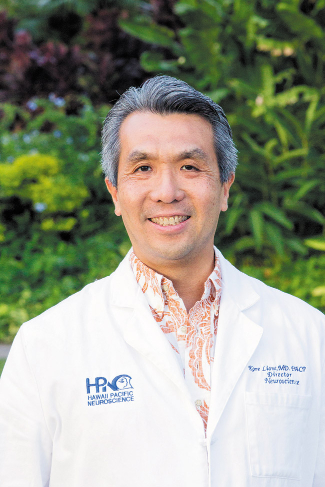Diet And Dementia: A Correlation
Dr. Kore Kai Liow
Director of the Hawaii Alzheimer’s Disease Center, Hawaii Pacific Neuroscience Institute
Where did you receive your schooling and training?
I completed my neurology training at University of Utah School of Medicine in Salt Lake City, and my neuro-science fellowship at National Institute of Neurological Disorders and Stroke in Bethesda, Md. I am the director of neuroscience and chair of the department of medicine at Castle Medical Center, and I’m a clinical professor of neurology at the University of Hawaii John A. Burns School of Medicine.
How long have you been in practice?
Close to 20 years.
Why did you choose to work with Alzheimer’s?
It is one of the most challenging and complex neurological conditions without a cure. However, it also holds the most potential and promise, with many exciting developments.
What is the connection between Alzheimer’s and dementia?
Dementia is memory loss affecting daily life. Dementia also may affect attention, language and problem-solving abilities. Alzheimer’s disease is the most common form of dementia, contributing to about three-quarters of dementia cases.
What risk factors are associated with decreasing brain faculty?
Age is the biggest risk factor. History of head trauma, depression and family history of Alzheimer’s are among other risk factors.
What do you currently recommend for keeping free of Alzheimer’s or dementia?
Studies have shown that people who stay mentally and physically active tend to show later onset of Alzheimer’s than those who lead a sedentary life. Our diet also may play a role, including avoiding eating processed foods.
Can you talk about the clinical trial you are conducting about the correlation between eating habits and Alzheimer’s?
The Hawaii Dementia Prevention Trial is designed to show that food choices affect our risk of dementia. We will start with patients with mild cognitive impairment. Mild cognitive impairment is the stage between normal aging and dementia. Our study is designed to slow the progression of mild cognitive impairment into dementia. We will use several nutritional interventions at the same time. We will attempt to slow the formation of senile plaques in the brain by supplying three nutrients. These nutrients have been shown in prior studies to quench the production of the brain plaques so common in Alzheimer’s patients.
Much of the damage to the brain in Alzheimer’s disease is induced by oxidation of delicate brain cell membranes. We will supply powerful antioxidants to protect the brain cells. One of the ways we will protect the brain from degeneration is to have study participants eat one cup of berries each day. We also will limit the dietary intake of certain dangerous proteins that have been shown to increase inflammation and oxidation in the brain. These advanced glycation endproducts can be avoided with a simple switch in cooking methods. Another powerful way to assist memory is to ensure an adequate supply of blood inside the brain. The brain, like the rest of the body, can have clogged arteries, interfering with blood flow. We will assist study participants in making dietary changes that have been shown to slow the buildup of arterial clogging. We also will have a specially designed tablet with targeted nutrition designed to assist brain function.
What is your team hoping/expecting to find?
It is too early to say yet, but we have a team working hard to look at how altering our lifestyle, particularly the way we eat, may slow or delay dementia. If we can protect the participants from further memory loss, we will have had a successful result.
What demographic are you looking to include in the study?
People older than 65 years who have a diagnosis of mild cognitive impairment. We are looking for 75 participants. Patients who enroll will have their diet and memory monitored for one to two years.
What will be expected of the enrollees?
They need to be able to complete neurological evaluations, and to be willing to change their diet.
Have you engaged in previous dementia research?
I have been involved in research for some time. I served previously as professor of neurology and directed the neuroscience program at the University of Kansas Wichita Medical School, where I was the investigator for more than 40 neuroscience clinical trials sponsored by the NIH (National Institutes of Health) and the CDC (Centers for Disease Control). I published more than 40 peer-reviewed publications in the neuroscience field and I served on the advisory panel at CDC, American Academy of Neurology and other national organizations to draft national position statements. I also serve on the state Alzheimer’s Disease and Related Dementia Task Force.
For more information on enrolling in Dr. Kore Kai Liow’s clinical trial on dementia, email kliow@HawaiiNeuroscience.com. If you do not use a computer, call Hawaii Pacific Neuroscience at 261-4476.






